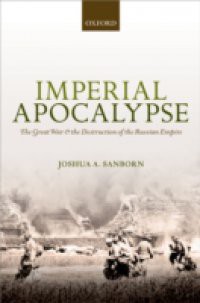Imperial Apocalypse describes the collapse of the Russian Empire during World War One. Drawing material from nine different archives and hundreds of published sources, this study ties together state failure, military violence, and decolonization in a single story. Joshua Sanborn excavates the individual lives of soldiers, doctors, nurses, politicians, and civilians caught up in the global conflict along the way, creating a narrative that is both humane andconceptually rich. The volume opens by laying out the theoretical relationship between state failure, social collapse, and decolonization, and then moves chronologically from the Balkan Wars of 1912-13 through the fierce battles and massive human dislocations of 1914-16 to the final collapse of the empire in the midst of revolution in 1917-18. Imperial Apocalypse is the first major study which treats the demise of the Russian Empire as part of the twentieth-century phenomenon of modern decolonization,and provides a readable account of military activity and political change throughout this turbulent period of war and revolution. Sanborn argues that the sudden rise of groups seeking national self-determination in the borderlands of the empire was the consequence of state failure, not its cause. At the sametime, he shows how the destruction of state institutions and the spread of violence from the front to the rear led to a collapse of traditional social bonds and the emergence of a new, more dangerous, and more militant political atmosphere.

